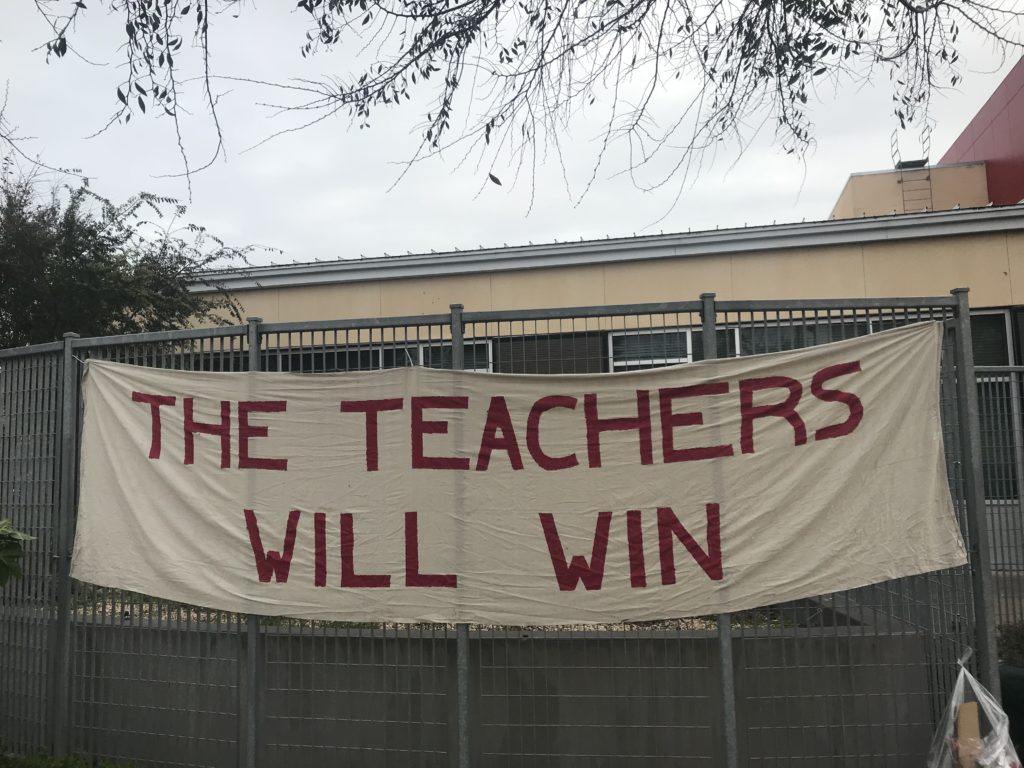As wages and homelessness are deeply linked, here is a Look at Labor in the Bay Area, 2019
Anchor Steam Unionizes
For a year Anchor Steam employees had been building momentum toward unionizing, one of the first such efforts in the craft brewing industry. With the help of the local DSA, they waited to file their intent to form a union until enough steam (no pun intended) had gathered to to do so. Once they were above board they had to avoid retaliation from management, who tried to ban employees from wearing pro-unions buttons at work in an attempt to stymie support and intimidate workers.
But they were not going to give up so easily. Working in one of the most expensive cities in the world, Anchor Steam employees found themselves consistently short on rent, and without the income they needed for basic necessities. Employees reported that when they had started working for the company they had felt taken care of and respected, that security had eroded overtime for a number of reasons. Not the least of these was that the company was bought out by the Tokyo-based Sapporo Holdings Ltd. in 2017.
Workers demands were simple: they wanted to be paid enough to live in the city, and, in the words of their hashtag, to be #anchoredinSF. On March 13, Anchor Steam employees voted overwhelmingly to join the International Longshore and Warehouse Union, become the first craft brewing employees to unionize.
Oakland Teachers Strike
At the end of February Oakland teachers followed the examples set by educators in Denver, Los Angeles and the state of West Virginia, started a weeklong strike, demanding higher pay, more school counselors and nurses, smaller classrooms, and a promise not to close dozens of schools slated to close to make way for charter schools. Teachers, students, families, and neighbors demonstrated all week outside of their schools and saw broad support from Oakland residents as well as from teachers in neighboring communities, who demonstrated their solidarity through walkouts and sick-ins.
After a fierce week of negotiations and hostility from the Oakland Unified School District, the city eventually agreed to increase Oakland teacher salaries by 11% and to hire on more counselors, as well as to offer more generous salaries to schools nurses. The district refused however to cave on their planned site closures or to the large class size reductions the teachers had pushed for.

Marriott Workers Strike
As 2018 came to a close, 2,500 workers at Marriott Hotels across the city went on strike to demand higher wages, less demanding workloads, and continued access to healthcare. The strike lasted for months and involved high profile actions, including a demonstration in Union Square on Labor Day that resulted in the arrests of 75 workers.
During the strike, scabs were bused in from neighboring areas to cover the hotel duties, and some reported being fired for communicating with union leaders and strikers while others allege they weren’t paid on time for their work. The demonstrations lasted for months and many organizations cancelled events they had planned to hold in Marriott hotels in solidarity with striking workers.
Finally, in December, the hotel management settled with the union, agreeing to the strikers demands. The settlement was nearly unanimously approved by the workers and included a raise of $4 per hour over the next four years.
AFSCME Strikes Against University of California
Despite organizing four strikes in less than a year, two of the largest unions are still working without a contract at the University of California. Thousands of workers — including researchers, social workers, psychologists, bus drivers, security guards and many others — are striking to demand a fair contract and a reversal of outsourcing. UC workers have filed an Unfair Labor Practice charge against the university system, alleging that it has illegally intimidated and violated the rights of workers who’ve gone on strike, saying workers have faced retaliation and threats of police citation.
Workers claim the reliance on contract labor has created a serious problem with income, racial, and gender inequality in the workplace and bypasses the rights union workers have fought for. On April 10, thousands of medical workers went on strike at five UC hospitals protesting the ongoing intimidation and the effort on the part of the unions to discourage union participation.
On a recent visit to UC, Bernie Sanders publicly blasted the UC for acting like a corporate employers and dismissing the needs of its workers. The struggle continues as AFSCME has called for a Speakers Strike, asking public figures to cancel their speaking engagements at the University until its workers have a contract. Stacey Abrams cancelled an engagement and tweeted her support for the strike last week.
Gig Drivers Push Back As Uber and Lyft Go Public
Uber and Lyft are both going public this years, and drivers are outraged. While the ride-hail companies are set to rake in millions from new investors the workers are barely getting by, and the company is cutting wages even further. That’s because, as contract workers, Lyft and Uber drivers are denied benefits generally associated with employment, such as health insurance, disability and unemployment benefits. Workers across the country, including here in San Francisco, have protested the move to go public, demanding that they be offered employment status, be allowed to organize as workers, and increase to a living wage.

